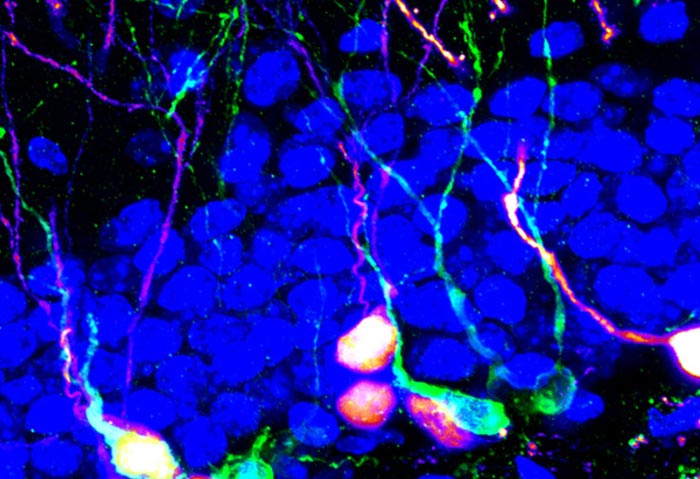Stimulating brain circuits promotes neuron growth

New adult-born neurons that contribute to memory and emotion regulation.
Credit: Song Lab, UNC-CH
… in adulthood, improving cognition and mood.
Led by Juan Song, PhD, scientists at the UNC School of Medicine used optogenetic techniques to stimulate specific brain cells to increase production of neural stem cells and neurons relevant to memory and emotion processing in animal models.
We humans lose mental acuity, an unfortunate side effect of aging. And for individuals with neurodegenerative conditions such as Alzheimer’s and Parkinson’s, the loss of cognitive function often accompanied by mood disorders such as anxiety is a harrowing experience. One way to push back against cognitive decline and anxiety would be to spur the creation of new neurons. For the first time, University of North Carolina School of Medicine scientists have targeted a specific kind of neuron in mice to increase the production of neural stem cells and spur on the creation of new adult neurons to affect behavior.
Targeting these cells, as reported in the journal Nature Neuroscience, modulated memory retrieval and altered anxiety-like behaviors in mice. Essentially, the UNC scientists boosted the electrical activity between cells in the hypothalamus and the hippocampus to create new neurons – an important process called neurogenesis.
“Targeting the hypothalamic neurons to enhance adult hippocampal neurogenesis will not only benefit brain functions,” said senior author Juan Song, PhD, associate professor of pharmacology, “but also holds the potential to treat cognitive and affective deficits associated with various brain disorders.”
Most neurons we carry for life were created before we were born and get organized during early childhood. But such neurogenesis continues into adulthood and throughout life. In fact, one of the reasons for cognitive decline and anxiety, and even diseases such as Alzheimer’s, is the suspension of neurogenesis.
Song, a member of the UNC Neuroscience Center, has been studying the detailed interplay between brain cells that keep neurogenesis chugging along. She knew that adult hippocampal neurogenesis plays a critical role in memory and emotion processing, and that neural circuit activity – think ‘electrical activity’ – regulates this process in a constantly changing manner.
What no one knew is whether this neural circuit activity could be manipulated to spur neurogenesis to such a degree that the effect would be seen as a changed behavior, such as better memory or less anxiety.
To see the effect of modulating neural activity, the Song lab conducted experiments led by co-first authors Ya-Dong Li, PhD, and Yan-Jia Luo, PhD, both postdoctoral fellows. They used optogenetics – essentially a method using light to trigger neuronal activity – in a small brain structure called supramammillary nucleus (SuM). The SuM is located inside the hypothalamus region of the brain; it helps manage things from cognition to locomotion and sleep/wakefulness.
When Song’s researchers chronically stimulated the SuM neurons, they discovered a robust promotion of neurogenesis at multiple stages. They observed increased production of neural stem cells and the creation of new adult-born neurons with enhanced properties. Optogenetic stimulation of these new neurons then altered memory and anxiety-like behaviors.
“We also show that the SuM neurons are highly responsive when the mice experienced new things in their environment,” Song said. “In fact, in a new environment, mice require these cells for neurogenesis.”
Impaired adult hippocampal neurogenesis correlates with many pathological states, such as aging, neurodegenerative diseases, and mental disorders. “Therefore,” Song added, “targeting the hypothalamic neurons to enhance adult hippocampal neurogenesis will not only benefit brain functions but also holds the potential to treat cognitive and affective deficits associated with various brain disorders.”
Other authors are Ze-Ka Chen, Luis Quintanilla, and Libo Zhang at UNC-Chapel Hill; Yoan Cherasse and Michael Lazarus at University of Tsukuba, Japan,; and Zhi-Li Huang from Fudan University, China.
This research was funded through National Institutes of Health, the Alzheimer’s Association, and NARSAD Young Investigator Award from the Brain & Behavior Research Foundation.
Confocal microscopy was performed at the UNC Neuroscience Microscopy Core Facility (RRID: SCR_019060) with technical assistance from Michelle Itano. The UNC Neuroscience Microscopy Core was supported in part by funding from NIH-NINDS Neuroscience Center Support Grant (P30 NS045892) and a NIH-NICHD Intellectual and Developmental Disabilities Research Center Support Grant (U54 HD079124).
Journal: Nature Neuroscience
DOI: 10.1038/s41593-022-01065-x
Method of Research: Experimental study
Subject of Research: Animals
Article Title: Hypothalamic modulation of adult hippocampal neurogenesis in mice confers activity-dependent regulation of memory and anxiety-like behavior
Article Publication Date: 6-May-2022
Media Contact
Mark Derewicz
University of North Carolina Health Care
Mark.Derewicz@unchealth.unc.edu
Cell: 919-923-0959
Original Source
All latest news from the category: Life Sciences and Chemistry
Articles and reports from the Life Sciences and chemistry area deal with applied and basic research into modern biology, chemistry and human medicine.
Valuable information can be found on a range of life sciences fields including bacteriology, biochemistry, bionics, bioinformatics, biophysics, biotechnology, genetics, geobotany, human biology, marine biology, microbiology, molecular biology, cellular biology, zoology, bioinorganic chemistry, microchemistry and environmental chemistry.
Newest articles

Innovative 3D printed scaffolds offer new hope for bone healing
Researchers at the Institute for Bioengineering of Catalonia have developed novel 3D printed PLA-CaP scaffolds that promote blood vessel formation, ensuring better healing and regeneration of bone tissue. Bone is…

The surprising role of gut infection in Alzheimer’s disease
ASU- and Banner Alzheimer’s Institute-led study implicates link between a common virus and the disease, which travels from the gut to the brain and may be a target for antiviral…

Molecular gardening: New enzymes discovered for protein modification pruning
How deubiquitinases USP53 and USP54 cleave long polyubiquitin chains and how the former is linked to liver disease in children. Deubiquitinases (DUBs) are enzymes used by cells to trim protein…



